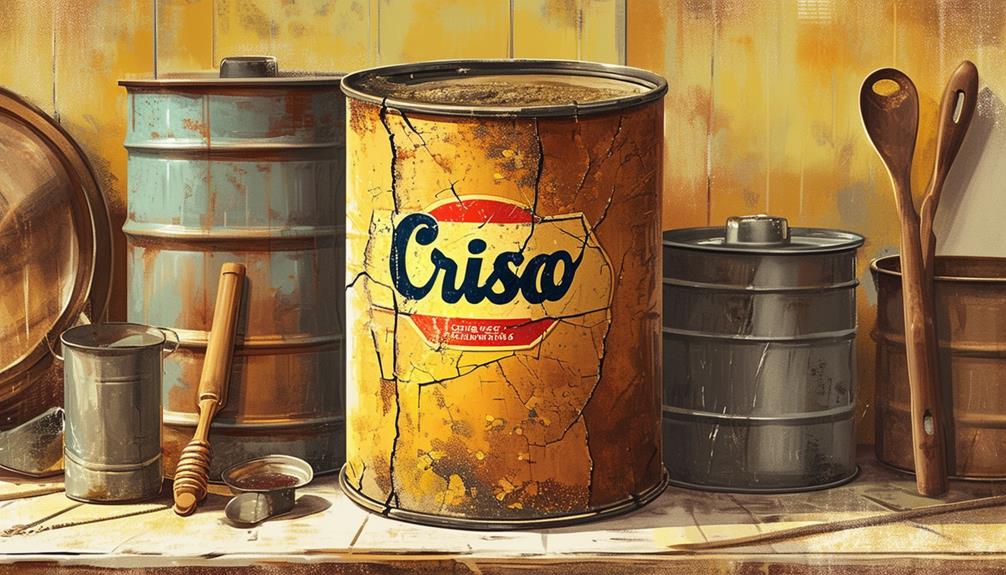As you scan the ingredient list on your Crisco container, you might assume it's a vegan-friendly option, thanks to its plant-based ingredients like soybean oil and palm oil. But, you're not entirely convinced. You've heard whispers about questionable additives like TBHQ and lactic acid esters, which might not align with your strict vegan principles. And what about the environmental and ethical concerns surrounding palm oil? As you weigh the pros and cons, you're left wondering: can you really trust Crisco to align with your values? The answer isn't as clear-cut as you'd hope.
Crisco's Vegan History Uncovered

Since its introduction in 1911, Crisco has undergone significant transformations, ultimately evolving into a vegan-friendly staple in many kitchens today.
You might be wondering, what makes Crisco vegan-friendly? The answer lies in its ingredients. Crisco is a vegetable shortening that contains no animal fat or by-products, making it suitable for vegan diets.
The primary ingredients, such as soybean oil and palm oil, are vegan-friendly and derived from plant-based sources. Furthermore, Crisco doesn't contain dairy or other animal-derived ingredients, aligning with vegan principles.
You'll also find mono and diglycerides in Crisco, which might raise some concerns regarding their vegan status. However, these ingredients are generally considered vegan-friendly.
All in all, Crisco's vegan-friendly composition has made it a popular choice for vegans and non-vegans alike. As you delve into the world of vegan cooking, you can confidently reach for Crisco, knowing it's a reliable and vegan-friendly option.
Crisco's Vegan Status Unclear
When you investigate Crisco's vegan status, you'll notice that the brand offers vegan-friendly flavors, but what does that really mean?
You'll need to analyze the ingredients, like the soybean oil blend formula, to understand what makes them vegan-friendly or not.
Crisco's Vegan Flavors Explained
As you investigate Crisco's vegan status, you'll notice that the brand offers a range of flavors that might raise some eyebrows. You're probably wondering which ones are safe for a vegan diet.
Let's take a closer look at Crisco's flavor options to help you make an informed decision.
- Soybean Oil Blend Flavor
- Canola Oil Flavor
- Vegan Baking Flavor Option
- Butter-Flavored Variant (with possible animal-derived ingredients)
Soybean Oil Blend Flavor
When you scan the ingredient list of Crisco's soybean oil blend flavor, you'll notice the presence of unspecified ingredients like mono and diglycerides, which can raise doubts about its vegan status.
As an all-vegetable shortening, Crisco's soybean oil blend flavor may contain trace trans fats.
The uncertainty surrounding mono and diglycerides' sources makes it challenging to confirm its vegan status.
Canola Oil Flavor
Scanning the ingredient list of Crisco's canola oil flavor, you'll likely encounter uncertainty about its vegan status due to potential undisclosed ingredients. This uncertainty stems from the possibility of additives or processing methods that aren't vegan-friendly.
To verify vegan compatibility, you should confirm the specific ingredients and sourcing of Crisco's canola oil flavor.
Vegan Baking Flavor Option
You're likely searching for a reliable vegan baking flavor option, but Crisco's unclear vegan status has you questioning its suitability for your recipes.
Crisco's butter-flavored variant raises concerns due to artificial butter flavor and mono and diglycerides. While it doesn't contain obvious animal-derived ingredients, the source of these additives is uncertain.
For vegan baking, a vegan butter alternative may be a safer choice.
Soybean Oil Blend Formula
Now that you've delved into Crisco's vegan flavors, it's time to scrutinize the soybean oil blend formula that makes up the base of Crisco.
This formula includes a few ingredients that may raise some eyebrows, especially for vegans. As you investigate the formula, you'll want to ponder the following points.
- Soybean Oil Blend Base
- Emulsifier Mono-Di Glycerides
- Natural Flavor Enhancer Incorporation
- Origin Uncertainty
Soybean Oil Blend Base
Crisco's soybean oil blend base, a proprietary formula, raises questions about its vegan status due to the unknown proportions of its ingredients. As a key component in Crisco's all-vegetable shortening, the soybean oil blend contributes to its unique texture and properties. Here's a breakdown of Crisco products:
| Product | Ingredient |
|---|---|
| Crisco Shortening | Soybean Oil Blend |
| Crisco Sticks | Soybean Oil Blend |
| Crisco Butter Flavor | Soybean Oil Blend |
| Crisco Baking Sticks | Soybean Oil Blend |
| Crisco All-Vegetable Shortening | Soybean Oil Blend |
Emulsifier Mono-Di Glycerides
When you investigate the ingredients in Crisco's soybean oil blend, the presence of emulsifiers like mono- and diglycerides raises concerns about the product's vegan status.
These emulsifiers can come from plant or animal sources, making it unclear whether Crisco is vegan-friendly.
Without clear labeling, you may question the suitability of Crisco in your vegan diet, highlighting the importance of ingredient verification.
Natural Flavor Enhancer Addition
As you scrutinize Crisco's soybean oil blend formula, the inclusion of natural flavor intensifiers raises a red flag, sparking doubts about the product's vegan-friendliness.
The incorporation of natural flavor boosters, combined with artificial butter flavors, creates uncertainty about the product's origin – are they from plant or animal sources?
The undisclosed sources of these ingredients only add to the confusion.
TBHQ Raises Vegan Concerns

Now that you're aware of Crisco's unclear vegan status, you're probably wondering what specific ingredients might be causing the confusion.
Two of these ingredients, gelatin-derived emulsifiers and lactic acid esters, are worth examining closely.
When you investigate the role of TBHQ, a synthetic preservative, in Crisco's formula, you'll want to take into account these additional factors that might impact your decision to include Crisco in your vegan diet.
Gelatin-derived Emulsifiers
When you're checking the ingredients of Crisco, you might notice some emulsifiers that raise vegan concerns. Specifically, you're looking for gelatin-derived emulsifiers, which could make Crisco non-vegan.
Let's take a closer look at the specific types of emulsifiers that might be hiding in your Crisco.
- Gelatin-derived Mono-Diglycerides
- Lactic Acid Esters
- Lactic Acid Esters of Glycerin
- Other potential animal-derived emulsifiers
Gelatin-derived Mono-Diglycerides
You might be surprised to learn that certain emulsifiers in Crisco, such as TBHQ, can contain gelatin-derived mono- and diglycerides, which raises significant concerns for vegans. These emulsifiers, derived from animal collagen, are not suitable for a vegan diet.
| Emulsifier | Animal Origin | Vegan-Friendly |
|---|---|---|
| TBHQ | ||
| Mono-Diglycerides | ||
| Diglycerides | ||
| Gelatin |
Please note that vegans should verify the sources of emulsifiers like TBHQ to make sure they align with their dietary choices.
Lactic Acid Esters
By examining the ingredients of Crisco, it becomes clear that lactic acid esters, typically derived from plant-based sources like corn or sugar beets, raise fewer concerns for vegans compared to other emulsifiers.
You'll find these esters are usually vegan, coming from natural sources.
This is a relief, as synthetic or animal-derived emulsifiers can be a concern.
Lactic Acid Esters of Glycerin
Moving beyond lactic acid esters, Crisco's Lactic Acid Esters of Glycerin raise further questions about the product's vegan status. Despite their complex-sounding name, these esters are vegan, derived from lactic acid esters of glycerol.
You'll be relieved to know that Crisco's Lactic Acid Esters of Glycerin have a synthetic nature, but are plant-based, making them suitable for a vegan diet.
TBHQ and Lactic Acid Esters
As you examine the ingredients in Crisco, you'll notice TBHQ and lactic acid esters, which can raise concerns about their vegan status. You might wonder about the origin of these additives and how they're used in the product.
To better understand these ingredients, let's take a closer look at the emulsifiers used in Crisco, including:
- Polysorbate 80
- Sodium Stearoyl Lactylate
- Sorbitan Monostearate
- Calcium Stearate Emulsifier.
Polysorbate 80
You might assume that Polysorbate 80, a surfactant used to mix oil and water in Crisco, is vegan-friendly, but its uncertain origin from animal or plant sources raises concerns about its vegan status.
This uncertainty stems from the fact that Polysorbate 80 can be derived from either animal or plant sources, leaving you wondering if it's suitable for your vegan diet.
Sodium Stearoyl Lactylate
While Polysorbate 80's uncertain origin raises concerns, another ingredient in Crisco, Sodium Stearoyl Lactylate, also sparks vegan doubts due to its potential animal-derived sources. This food additive can be plant-based or animal-derived, making its origin unclear. Check the table below to understand the differences.
| Ingredient | Origin |
|---|---|
| Sodium Stearoyl Lactylate | Plant-based or Animal-derived |
| Lactic Acid Esters | Plant-based or Animal-derived |
| TBHQ | Synthetic |
| Emulsifiers | Plant-based or Animal-derived |
Sorbitan Monostearate
Sorbitan Monostearate, a common emulsifier in Crisco, raises vegan concerns despite being derived from plant-based sources, thanks to its potential impact on animal testing and environmental ethics.
As a vegan, you might wonder if this additive is truly vegan-friendly. While it's plant-based, you should consider the potential consequences of its production process on animal welfare and the environment.
Calcium Stearate Emulsifier
In addition to sorbitan monostearate, another emulsifier in Crisco raises concerns among vegans: calcium stearate, which has a potential animal-derived origin that may not align with strict vegan principles.
When examining Crisco's ingredients, you'll find that calcium stearate, an emulsifier, may be sourced from animals, making it non-vegan. This adds to the uncertainty surrounding Crisco's vegan status.
Crisco's Vegan Future Uncertain
While evaluating Crisco's ingredient list, you'll likely notice that the ambiguity surrounding mono and diglycerides raises more questions than answers about its vegan status. These additives, often derived from animal sources, can be a deal-breaker for strict vegans.
However, it's the palm oil used in Crisco that raises environmental concerns due to widespread deforestation. While palm oil itself is vegan, the harm it causes to ecosystems can't be ignored. Some vegans choose to avoid Crisco due to these sustainability issues, along with the presence of trace trans fats and the highly processed nature of the product.
When weighing the pros and cons, keep in mind that Crisco may not meet strict vegan standards due to potential GMO ingredients and additives. It's up to you to decide whether Crisco fits into your vegan lifestyle.
Individual assessment is necessary to determine Crisco's compatibility with your dietary choices. By carefully considering the ingredients and their implications, you can make an informed decision that aligns with your values and dietary needs.
Conclusion
So, is Crisco vegan?
The answer isn't straightforward. While Crisco's plant-based ingredients like soybean oil and palm oil seem vegan-friendly, concerns around TBHQ, lactic acid esters, and emulsifiers of uncertain origin muddy the waters.
Add to that the environmental and ethical issues surrounding palm oil, and Crisco's vegan status remains unclear.
Ultimately, it's up to you to weigh the pros and cons and decide whether Crisco aligns with your personal vegan principles.
